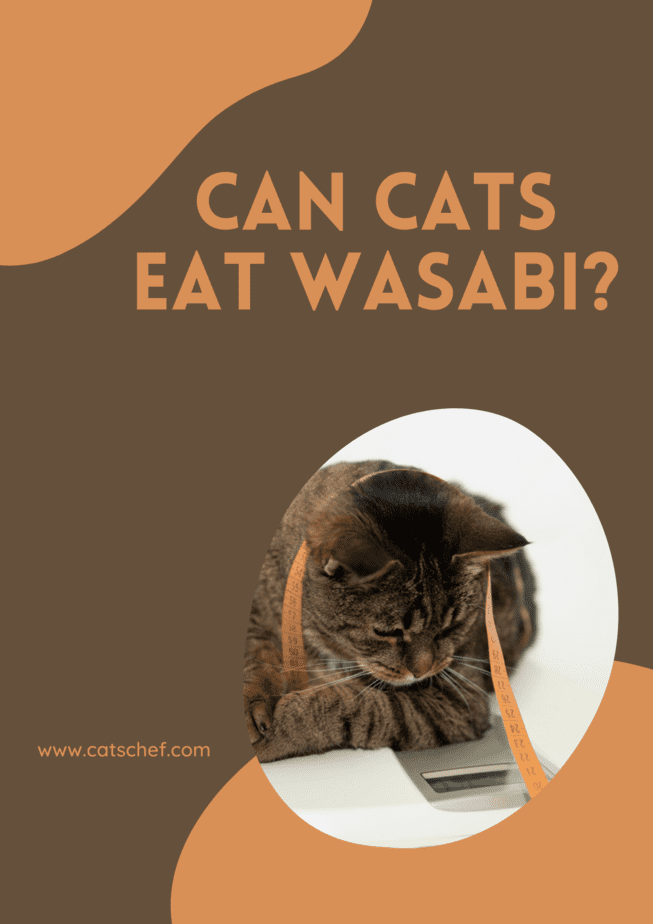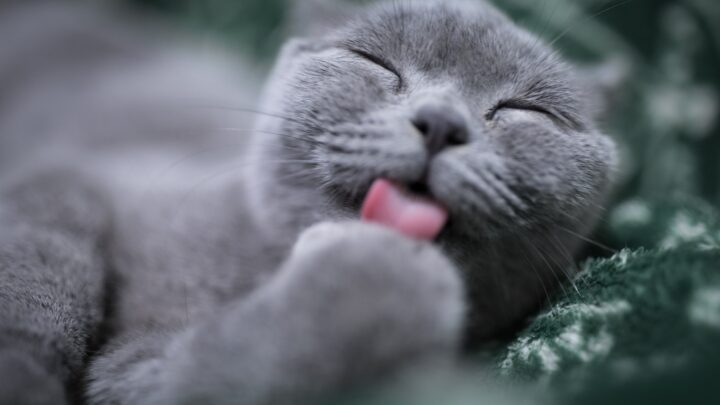If you’re an Asian cuisine enthusiast, you probably noticed the blob of greenish paste normally served next to whatever you ordered. It seems as if it’s particularly intriguing to your furry friend as she tries to give it a tiny lick every time she sees it on your plate. Can cats eat wasabi?
You can’t say no to your precious purrincess! When she looks at you with those adorable little eyes, you can’t help but agree to let her have a taste. This garnish might take pride in its strong flavor, but your cat doesn’t seem to be bothered by it at all.
Luckily for you, authentic wasabi paste isn’t toxic to cats. That said, while they can enjoy it without adverse reactions, this spicy garnish isn’t popular in the feline world. Chances are your feline friend will give it a try, a lick, or even a nibble out of sheer curiosity… and that’s it!
Wasabi contains isothiocyanate, which is a natural cat repellent. Even if your curious creature still decides to give it a try, you shouldn’t expect to see her reaching for wasabi ever again. Beware, next time she might go for your sushi rolls instead!
So, can cats eat wasabi safely? While wasabi won’t put your precious pet in any immediate danger, you should be mindful of the amount she consumes. Satisfy her curiosity and leave it at that!
It’s best not to include wasabi in her regular diet, and here are some reasons why.
Real wasabi vs. imitation wasabi
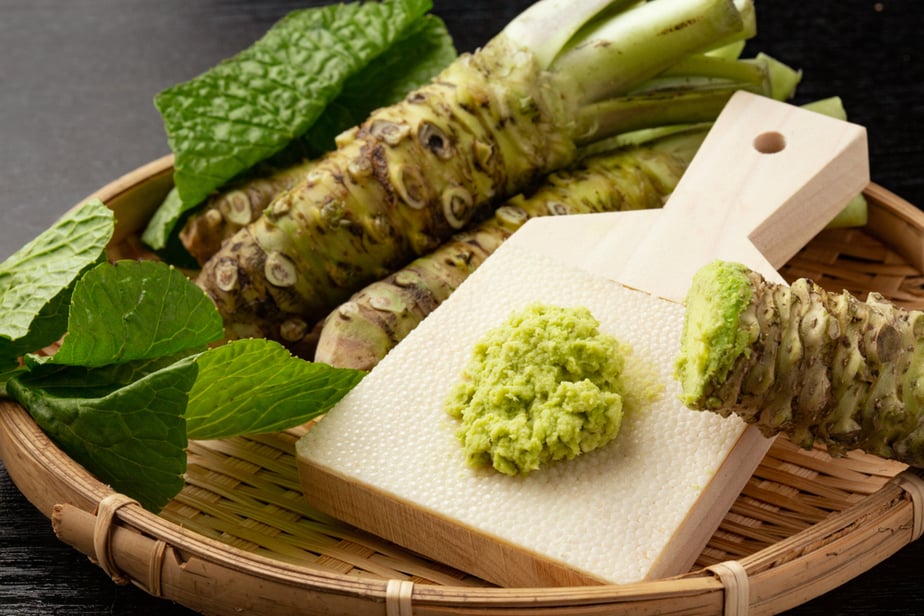
Let’s start from the beginning!
When we talk about wasabi, we typically refer to the flavorsome, greenish paste that’s served with sushi. This spicy garnish is incredibly popular around the world because it brings out the flavor of food and gives it that mouth-watering kick.
Real wasabi is made from a Japanese horseradish plant. Wasabia Japonica can only be grown naturally in, you guessed it, the riverbeds of Japan. Since it’s fairly difficult to find anywhere else in the world, the price point of this horseradish paste makes it unattainable to most restaurants.
Here’s where the imitation wasabi comes in! Imitation wasabi is made from regular horseradish, mustard powder, green food coloring, and cornstarch. It’s much cheaper, available everywhere in the world, and most likely what’s on your plate when you order a platter of sushi.
You’re not bothered by the fact you’ve been tricked into thinking you’re eating the real deal. But, your cat might not share the same opinion. While real wasabi isn’t toxic to cats, the imitation one might lead to serious health issues.
So, can cats eat wasabi? If you’re planning on sharing some with your fiery feline, you should take a couple of things into consideration.
Real wasabi might offer an array of nutritional and health benefits to your cat (if she can appreciate the spice). Imitation wasabi, on the other hand, might make her run to the litter box!
If cats can eat wasabi, does that mean they should?
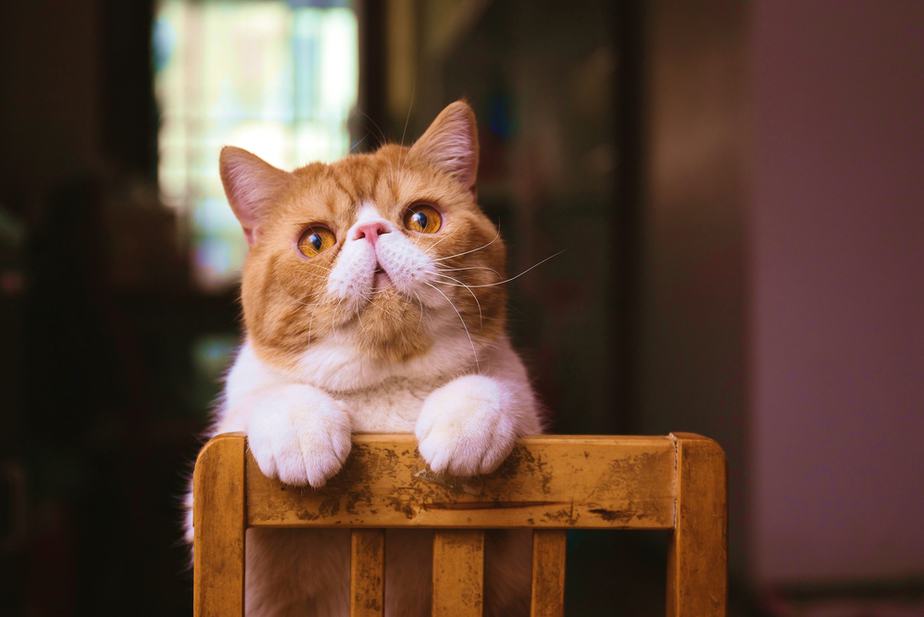
Oh, the age-old question of whether cats can eat human food… It’s never an easy task to provide an answer with certainty. While some foods might not be toxic to cats, it’s a matter of good judgment whether you should let them eat those foods regularly.
If cats can eat wasabi, does that mean they should? Wasabi is one of those things your feline friend might want to try out of sheer curiosity. The real deal might make her scrunch up her nose and walk away, but it will provide her with some nutritional and health benefits at the same time.
Imitation wasabi is where you should draw the line. While regular horseradish isn’t on the list of toxic ingredients, it does carry potential health risks (including skin irritation and eye infection). Your feline friend should also steer clear of mustard, but more on that subject a bit later.
Whether it be real or imitation wasabi, it’s best to not include this pungent garnish in your cat’s regular diet. If you can get your hands on the real deal, feel free to let her have a little taste. However, if the only thing you can find is imitation wasabi, it’s best to avoid it altogether. And if you need more convincing…
Can cats eat real wasabi?
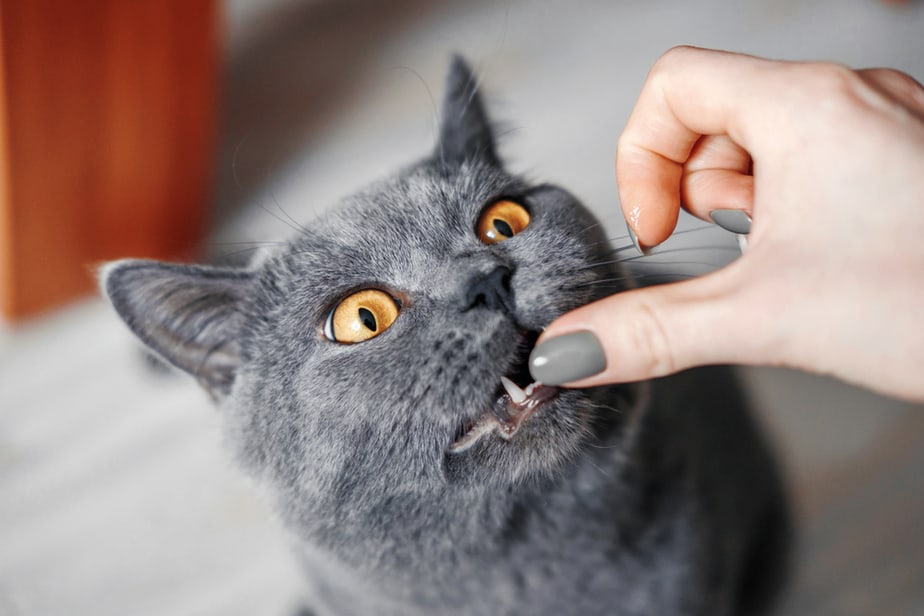
As mentioned before, real wasabi is made from Japanese horseradish. Since it can’t be grown anywhere else in the world, Wasabi Japonica can rack up quite a price – we’re talking between $160 and $250 per kilogram! I guess the best costs, right?
If money isn’t your concern and the only thing you’re wondering is whether cats can eat real wasabi, this is your lucky day. Not only is this incredibly rare garnish not toxic to cats, but it also comes with heaps of health benefits.
Firstly, wasabi contains isothiocyanate, which prevents the growth of salmonella, Escherichia coli, Helicobacter pylori, and Staphylococcus. If your mischievous monster manages to steal a lick or two of this flavorsome paste, it might offer her a helping paw against food poisoning.
This is one of the main reasons wasabi is often served with seafood. Since it has antiparasitic properties, it makes for a great ally when you’re eating raw meat. (Side note: Even with all the wasabi in the world, you should never feed your cat raw seafood!)
Secondly, the same isothiocyanate also prevents Streptococcus from growing in your cat’s mouth. Streptococcus is actually the main culprit when it comes to tooth cavities and decay.
And if that wasn’t enough, wasabi is also a great tool in feline cancer prevention. Real wasabi contains the compound 6-MITC, which can induce the death of cancerous cells in your cat’s stomach.
Lastly, this incredible garnish offers anti-inflammatory properties and helps promote weight loss. If you have a chonky on your hands, you might want to start adding real wasabi to her bowl every once in a while. You should, however, consult with your vet before introducing this garnish to your cat’s diet.
What’s the deal with imitation wasabi?
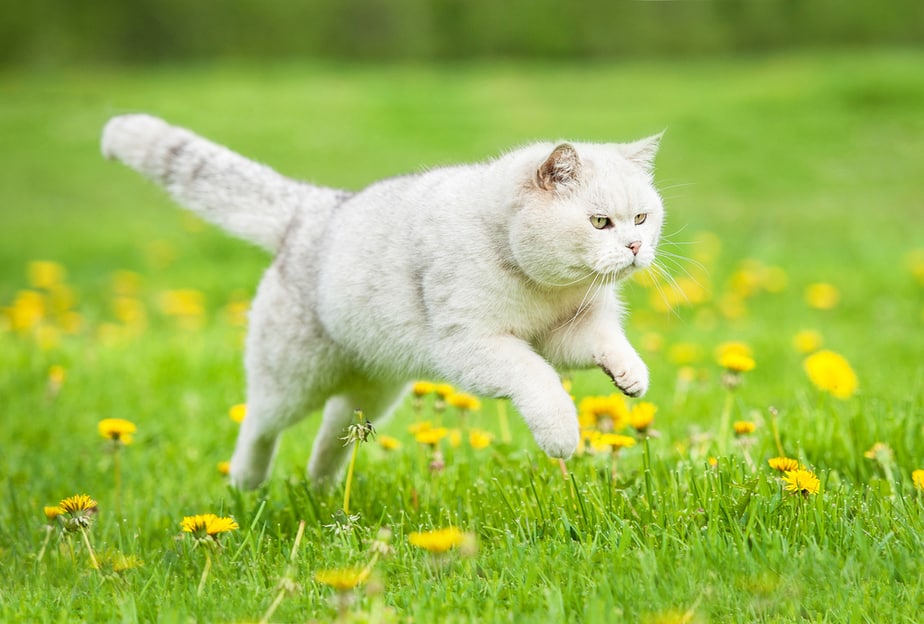
Here’s where the problems arise. Since real wasabi isn’t available in most parts of the world, restaurants and markets use imitation wasabi as a substitute.
Imitation wasabi is made with regular horseradish, mustard powder, green food coloring, and cornstarch.
Not only do these ingredients not make up for the healing properties of real wasabi, but they can also cause serious damage to your cat’s digestive system. Two main components of the imitation paste, horseradish and mustard, aren’t recommended for feline consumption.
Here’s the thing. Horseradish isn’t the best thing to feed your furry friend. While it isn’t toxic, it can lead to digestive issues because it contains a glucosinolate called sinigrin, which can cause eye or skin irritations when hydrolyzed.
Moreover, mustard can cause severe gastrointestinal diseases such as gastroenteritis. If your picky eater manages to steal some mock wasabi, you might want to keep an eye out for symptoms like vomiting, diarrhea, dry heaving, lethargy, and decreased appetite.
Consuming an excessive amount of imitation wasabi can also leave your cat severely dehydrated. If you notice any of these symptoms, you should contact your vet immediately. It’s better to be safe than sorry, so you’ll want to keep your wasabi out of your cat’s reach.
It’s also important to mention that kittens shouldn’t eat any type of wasabi, real or imitation. Not only are their little stomachs are too sensitive and delicate, but they also require a healthy, kitty-appropriate diet that supports their continuous development. Wasabi will give your kitten tummyache!
Lastly, if you can get your hands on the real deal, you should avoid imitation wasabi. Both you and your furkid deserve good quality food! If you can’t afford to procure Wasabi Japonica, you should steer clear of this pungent paste altogether.
Can cats eat wasabi peas?
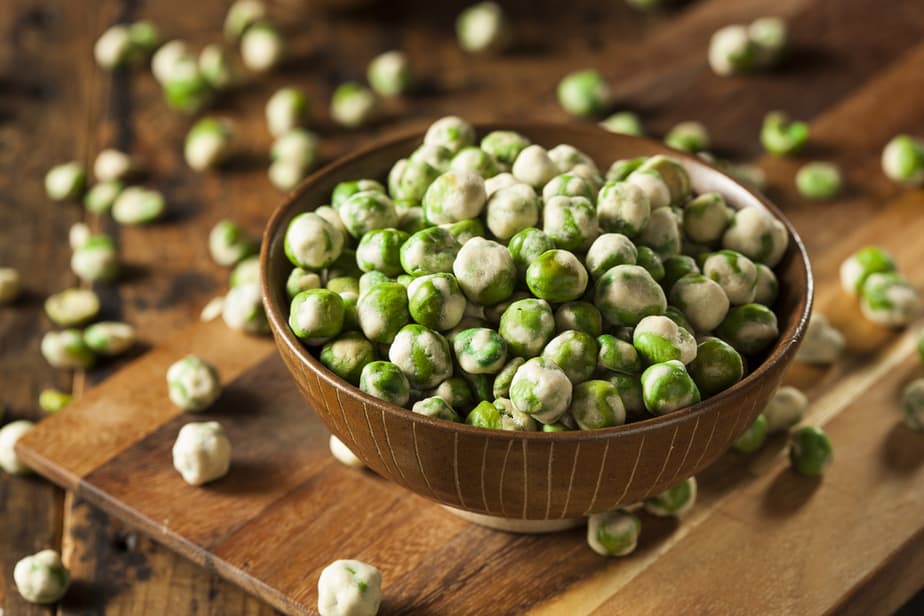
If you’ve never eaten wasabi peas, you have no idea what you’re missing out on! Wasabi peas, as the name suggests, are regular green peas that have been roasted and coated in wasabi. Other than peas, this popular snack can also contain traces of salt, herbs, and seasonings.
To answer your question, cats can eat wasabi peas, but that doesn’t mean they should. A little nibble is unlikely to cause your precious pet any harm, but adding them to her regular diet might not be the brightest idea. Hmm, why is that, you ask?
Wasabi might be too spicy for your cat’s sensitive stomach, in turn, leading to digestive issues. In addition to that, peas are packed with fiber, which may lead to frequent litterbox visits. These green balls aren’t as harmless as they might appear!
Did you know regular green peas might lead to feline gastrointestinal issues and kidney failure!? Then add heaps of salt, garlic powder, and unfavorable herbs… You get the memo! It’s safe to say that you should avoid feeding your furry friend any amount of wasabi peas.
Can cats eat wasabi sushi?
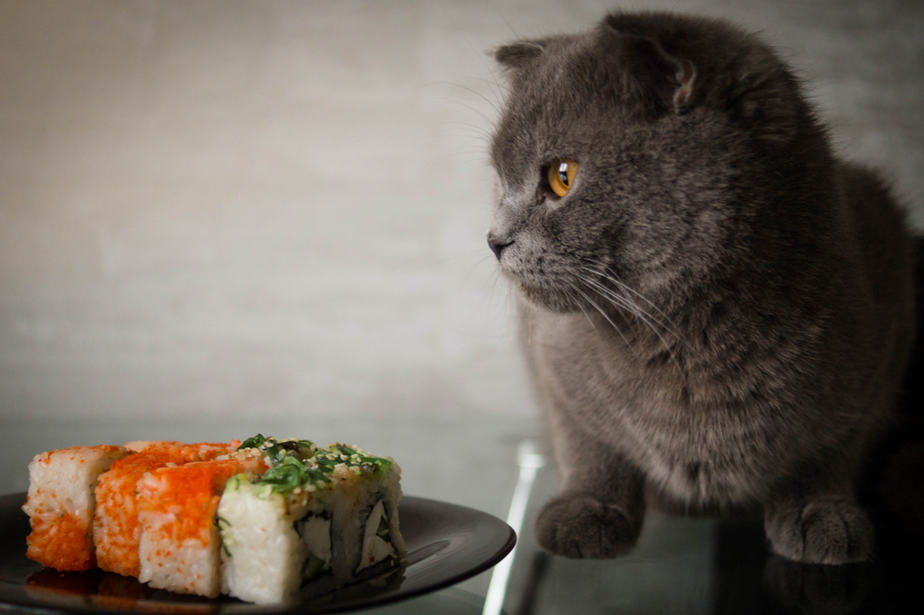
If you caught your cat eyeballing your sushi platter on more than one occasion, there are a couple of things you should take into consideration. We’ve already touched on the risks of adding imitation wasabi to your cat’s regular diet, but what about sushi?
Cats are notorious for their love of marine life. But, you should think twice if you’re considering the idea of sharing some sushi with your trusty sidekick. Raw fish isn’t safe for cats as it may contain bacteria, parasites, and something called thiaminase.
Thiaminase is an enzyme responsible for breaking thiamine (or vitamin B1) in your cat’s body. If your seafood lover accidentally consumes sushi or anything containing raw fish, she might be at risk of developing a thiamine deficiency.
This is a serious condition that can lead to neurological problems, convulsions, and even coma. If you throw imitation wasabi and its health repercussions into the mix, it’s safe to say you should definitely not introduce wasabi sushi to your pet’s diet.
Are you disappointed because the two of you can’t share your favorite Sunday lunch? Here are a couple of things you can do to ensure your precious pet gets her well-deserved seafood extravaganza!
It’s simple. You can order grilled salmon sushi and ask the cook to skip the harmful seasonings. Or, you can try making sushi from scratch. Add some authentic Japanese wasabi and you have yourself (and your cat) a feast!
